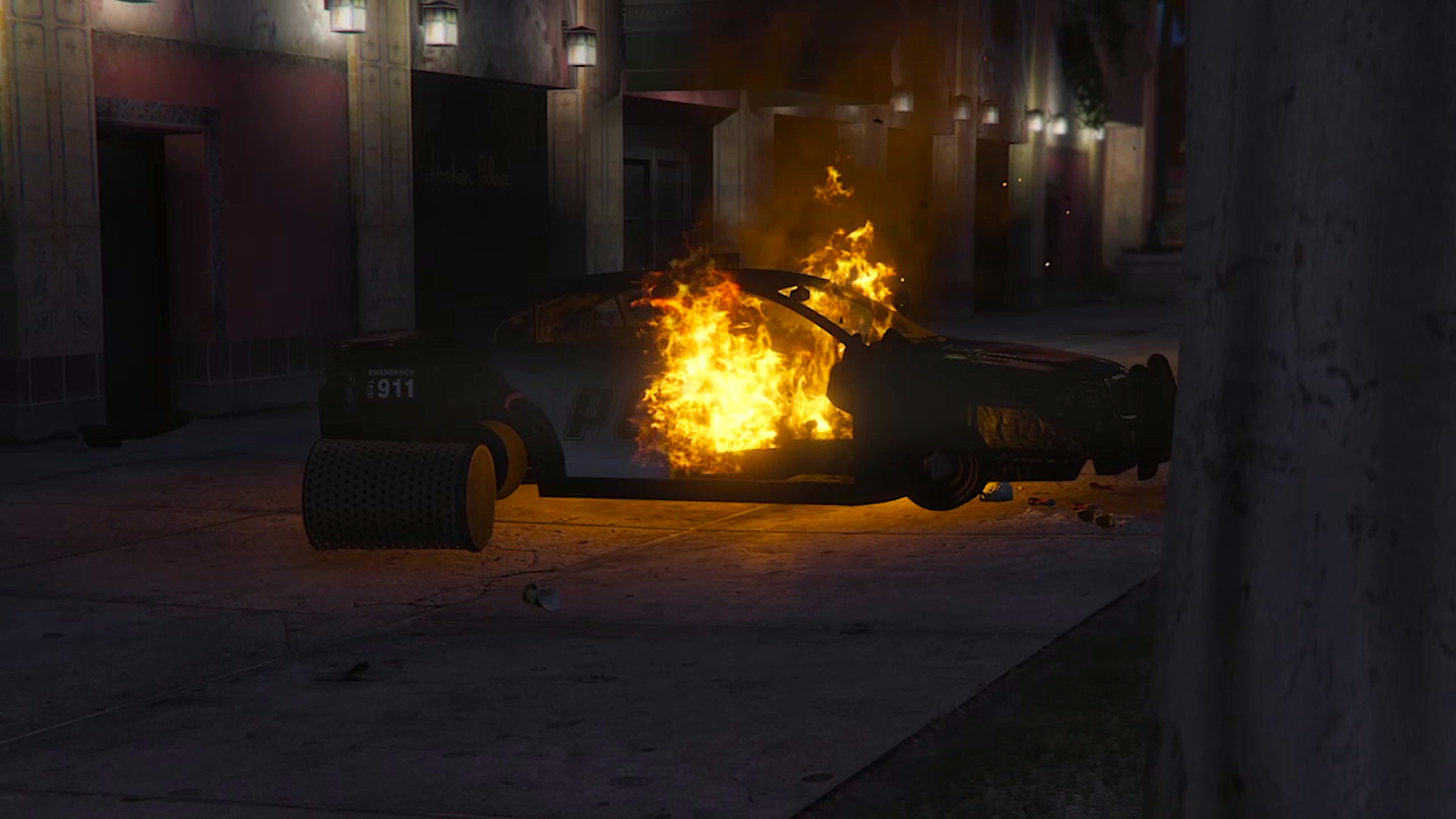REASONABLE_3
digital video (1920 x 1080), sound, color, 3’ 33”, 2020, United States/Italy
Created by COLL.EO
Volatile. Fiery. Flaming. Heated. In flames. Sizzling. Gleaming. Alight. Ignited. Automobile. Car. Wagon. Truck. Van. Law Enforcement. Siren. Horn. Warning. Brawl. Storm. Disturbance. Turbulence. Turmoil. Uproar. Commotion. Emergency. Scene. Shots. Scream. Screech. Howl. Wail.
COLL.EO is a collaboration between Colleen Flaherty and Matteo Bittanti established in 2012 which operates in San Francisco and Milan. COLL.EO creates boldly unoriginal media artworks, uncreative mobile sculptures, and uniquely derivative conceptual pieces. With the use of appropriated materials borrowed from a day-to-day context, COLL.EO has developed a filthy rich visual vocabulary addressing artistic, social, and political issues. COLL.EO generates situations in which everyday objects - often toys and games - are altered or detached from their original contexts. Sometimes they appear idiosyncratic and quirky, at other times sinister and morbid, like most by-products of American superabundance and pervasive marketing.
Random Parts: You’ve used Grand Theft Auto V for several projects. Why are you so fascinated by this particular game?
COLL.EO: Politicians, pundits, and the mass media often argue that video games have a detrimental influence on America. But their fears are misplaced. In fact, the real issue is the detrimental influence of America on video games. When you consider the country’s history and legacy – institutionalized racism, pervasive violence, environmental injustice, and normalized segregation – the idea that first-person shooters could make the situation any worse is frankly ludicrous. In many ways, video games – a byproduct of neoliberal ideology – are the most rational cultural and industrial expression of an irrational society, tore apart by tribalism, conspiratorial thinking, and good old greed. There’s a famous passage in Jean Baudrillard’s America where he describes Disneyland as “real” and the rest of America nothing more than a simulation. According to the French philosopher, “Disneyland is there to conceal the fact that it is the ‘real’ country, all of ‘real’ America, which is Disneyland (just as prisons are there to conceal the fact that it is the social in its entirety, in its banal omnipresence, which is carceral). Disneyland is presented as imaginary in order to make us believe that the rest is real, when in fact all of Los Angeles and the America surrounding it are no longer real, but of the order of the hyperreal and of simulation. It is no longer a question of a false representation of reality (ideology), but of concealing the fact that the real is no longer real, and thus of saving the reality principle.” It may seem that Grand Theft Auto, like Disneyland, is just a fiction, a narrative, a fantasy. Instead, there’s nothing real about America. When armed cosplayers storm the Capitol to kidnap and execute politicians, it is obvious that you are not dealing with a real country any longer, but a deranged video game. Grand Theft Auto is “real”. America is a dystopian movie. When you realize that the same country that is advocating and exporting “freedom and democracy” (TR) has the highest number of inmates in the world and its police force executes civilians on a daily basis, well, the “fictions” it produces no longer make sense. The truth is that it is becoming increasingly hard for video games to keep up. Baudrillard’s idea that America is, first and foremost, a carceral state (both pragmatically and conceptually) has never been proven wrong.
Random Parts: If video games are not a representation of society but, as you suggest, society is simply an emanation of video games, what kind of worldview (or worldviews) have become dominant nowadays?
COLL.EO: Most mainstream video games are cryptofascist insofar as they promote autocratic, patriarchal, violent values. They are a vessel for white supremacy, providing fantasies of power for a generation that has experienced diminishing returns from their human-capital investments: like neoliberal doctrine, video games promise “empowerment” and “self realization” to the “entrepreneurial gamer”. There’s a strong connection between the video game imaginary and rightwing accelerationism. Consider the far right movement known as Neoreaction: in The Atlantic, Rosie Gray describes “an ideology obsessed with both the mechanics of power and autocratic governance, and with aesthetics. Some neoreactionaries have a Tumblr devoted to their aesthetic vision, called Post-Anathema. The images tend to be futurist and hyper-masculine; soldiers with guns, tanks, spaceships, Greek gods.” This, pretty much, sums up the dominant video game imaginary: Call of Duty, God of War, Destiny, World of Tanks…
Random Parts: If fringe movements use this kind of aesthetics to define their imaginary, shouldn’t we pay attention to the games’ narratives as well? Doesn’t the Symbolic, in Lacanian terms, also provide the language used by both extremists and Sunday rioters as well to make sense of reality or to create a brand new one?
COLL.EO: Indeed. Consider, for instance, Tom Clancy’s The Division and its sequel. On the surface, we’re dealing with the usual hypermasculine action game mimicking the basic plot of your average Hollywood blockbuster, which is produced with a twelve year old viewer in mind. But the game’s ability to premediate current events – in Jay David Bolter and Richard Grusin’s sense of the term – is nothing less than fascinating. The former begins with a viral epidemic that wrecks havoc in the United States, forcing a major lockdown on many cities. The near future America depicted by The Division is populated by disillusioned, former military soldiers gone rogue that formed their own militias. Does this ring a bell? Moreover, one of the major plot points of the sequel has Washington D.C. under siege as a large number of insurrectionists converge to storm the Capitol. So, what’s going to happen in the third episode? Should we expect a scenario along the lines of Designated Survivor, perhaps? Nothing is true and everything is possible. Better keep an eye on them games…
Random Parts: But how can we make sense of the relationship between culture and ideology?
COLL.EO: Angela Nagle (and Antonio Gramsci, the original reference) was absolutely correct in suggesting that politics descend from culture and not vice versa. It is therefore crucial to pay attention to culture wars because they highlight symbolically, rhetorically, performatively, issues that matter most to people. Culture is always political. Bret Easton Ellis’s distinction between aesthetics and ideology is either trolling or naivete. Probably both. Culture gets people killed all the time. Culture ignites wars. And even though all the big decisions may well indeed be preordained by technocratic élites – Edward Bernays’s so-called “invisible government” that manages mainstream culture – the squadristi can occasionally turn against their masters. In Hari Kunzru’s latest novel, Red Pill, cryptofascism is sold to the masses through popular culture, i.e. a nihilistic tv series, an ersatz 24, and an upcoming fantasy à laGame of Thrones. The ideological power of video games – and their enormous influence on large swaths of the population, especially the most frustrated, disillusioned, and nihilistic groups – should not be underestimated. As Kunzru writes, popular culture is “a portal through which all manner of monsters could step into our living room.”
Random Parts: According to the latest market research, almost two billion people play video games. Why are video games so popular, so influential? Where does their appeal consist of?
COLL.EO: Video games provide the illusion of agency, control, and power to a generation that has seen their future compromised and their chances of living the “good life” (Lauren Berlant) vanish. Like advertising (John Berger), video games are inherently aspirational. It’s easier to stay indoors, amass virtual fortunes, and be content while the planet is collapsing. The inertia of governments, the bad faith of corporations, and the blissful indifference of the hoi polloi have led to climate catastrophe, but as long as I can rely on broadband, I have a chance to become the king of my virtual hill, so who cares? Do not un derestimate the persuasive power of the virtual, because that’s pretty much all that is left. Games are not merely competitive, but compensative. When he was selling virtual reality to the masses, Palmer Luckey argued that, as fewer and fewer people will have access to natural environments that do not look like dumps, VR is the only way for the precariat to vicariously experience the beauty of a world that is gone. He said all this unironically, by the way, proudly wearing his flip flops. Lastly, as Žižek argues, the appeal of video games lies in their peculiar temporality, which he calls “vampiric”: the protagonist of a video game never fully dies. Like Jesus, he can always come back. He can always restart the task, reboot the scene, and try again. Choices are not irreversible. In video games, time is not linear but circular. Video game narratives allow for a multiplicity of scenarios and situations. All of these iterations seem to possess the same epistemological quality. Žižek concludes that this proliferation of narratives perfectly mirrors our present. Today, multiple stories coexist simultaneously, from conspiracy theories to capitalist fantasies of infinite growth, perhaps the most corrosive fiction of all. To understand what’s going on today, one should grasp the totality of scenarios and situations. See the bigger picture. But that’s an impossible task, as scenarios and situations keep multiplying virally. The game cannot be won. We are stuck in a loop.
Random Parts: Is there anything else you’d like to add?
COLL.EO: Buy American?
REASONABLE_3
digital video (1920 x 1080), sound, color, 3’ 33”, 2020, United States/Italy
Created by COLL.EO, 2020
Courtesy of COLL.EO, 2021
The audio includes snippets from the following sources:
https://twitter.com/cypheruntoId/status/1268016850555686913
https://twitter.com/gIorytaes/status/1268116853039271936
https://twitter.com/AnnuKaushik253/status/1266094954956435456
https://twitter.com/edjustdid/status/1265909163575648261
https://twitter.com/_Tainoow/status/1266313110551277568
https://twitter.com/ChiefSo03940502/status/1266614509046837253
https://twitter.com/SPENDANIEL/status/1267935798772588546
https://twitter.com/MGSchneider76/status/1267927743729209346
https://twitter.com/Instalive3/status/1267882866781966336
https://twitter.com/lirianoluiggi/status/1267876397294460935
https://twitter.com/BabeyHui/status/1267873351164399617
https://twitter.com/IbneHaider17/status/1267476722649358337
https://twitter.com/AugustusPember3/status/1267685284176519169
https://twitter.com/kayleyshae/status/1267795731173105664
https://twitter.com/FarukFirat1987/status/1267703240604483584
https://twitter.com/__edb__/status/1267534668116656138
https://twitter.com/shahmir_niazi/status/1267505101507375104
https://twitter.com/reinaldo_lopezm/status/1267310791172251648
https://twitter.com/SSMoghadam/status/1267329429962780672
https://twitter.com/FordFischer/status/1267346369670496264
https://twitter.com/YourAnonCentral/status/1267353342222594048
https://twitter.com/CoronelJhomary/status/1267483359321698308
https://twitter.com/taesottona/status/1267442600283422721
https://twitter.com/BlueMediaProj/status/1267316496583270400
https://twitter.com/RosenbergShay/status/1266229481804566528
https://twitter.com/jhall/status/1266227538122211331
https://www.youtube.com/watch?v=oBOIXqjkiIs&t=309s
https://www.youtube.com/watch?v=eH7bG5WAK6c
https://www.youtube.com/watch?v=y9svvLWU_-A
https://www.youtube.com/watch?v=3oWTki2NNtI
https://www.youtube.com/watch?v=zoc3f_1iL24
https://www.youtube.com/watch?v=wcDe1UQUxks










